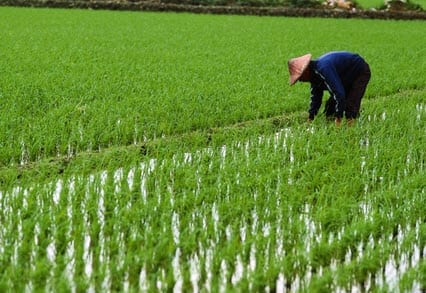Millions of growers have been persuaded by policymakers to cover themselves against losses from this phenomenon.
 Chinese farmers are more than aware of the damage that extreme weather can cause to a crop, and they are now protecting themselves with climate change insurance in the hopes of reducing the losses that they experience if severe weather should strike.
Chinese farmers are more than aware of the damage that extreme weather can cause to a crop, and they are now protecting themselves with climate change insurance in the hopes of reducing the losses that they experience if severe weather should strike.
Last year was a lesson that was hard learned by farmers in China, when extreme weather devastated crops.
Only weeks before the rice harvest, last summer, paddies were struck by extreme weather that is being attributed to global warming. The unseasonably warm temperatures of 95 degrees Fahrenheit cooked many rice farming regions for more than a month, damaging the production of the grains through what is known as leaf yellowing. Some farmers saw a decrease of 20 percent or more in their rice yields, when compared to previous years. This year, climate change insurance products have been designed to help those farmers to protect themselves from a repetition of this struggle.
The sales of climate change insurance were boosted when uninsured farmers saw the difference it made to others.
Many farmers already had coverage for their crops and when their losses were notably lower than those who were uninsured, this made a big difference to the opinion that many growers had about purchasing a policy and the value that they could bring. While these policies don’t recover the complete loss that can occur after a bad production year, it can help to reduce the financial pressure in a meaningful way.
This year, a great many Chinese farmers are now using insurance coverage as a type of risk mitigation tool to protect them against the damage that climate change and rising temperatures are bringing on a more frequent basis. This trend has made China the second largest agricultural coverage market in the world, with the United States in the top place in terms of premium income. Now, more than ever before, China is working to spread the use of this coverage throughout many different sectors, even beyond farming.
The goal is to bring climate change insurance to a number of other industries in order to protect their sectors from the damage that can come with unexpected extreme weather.
